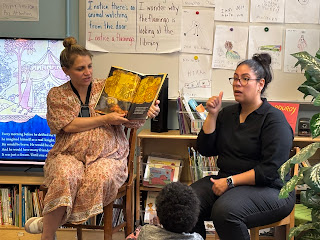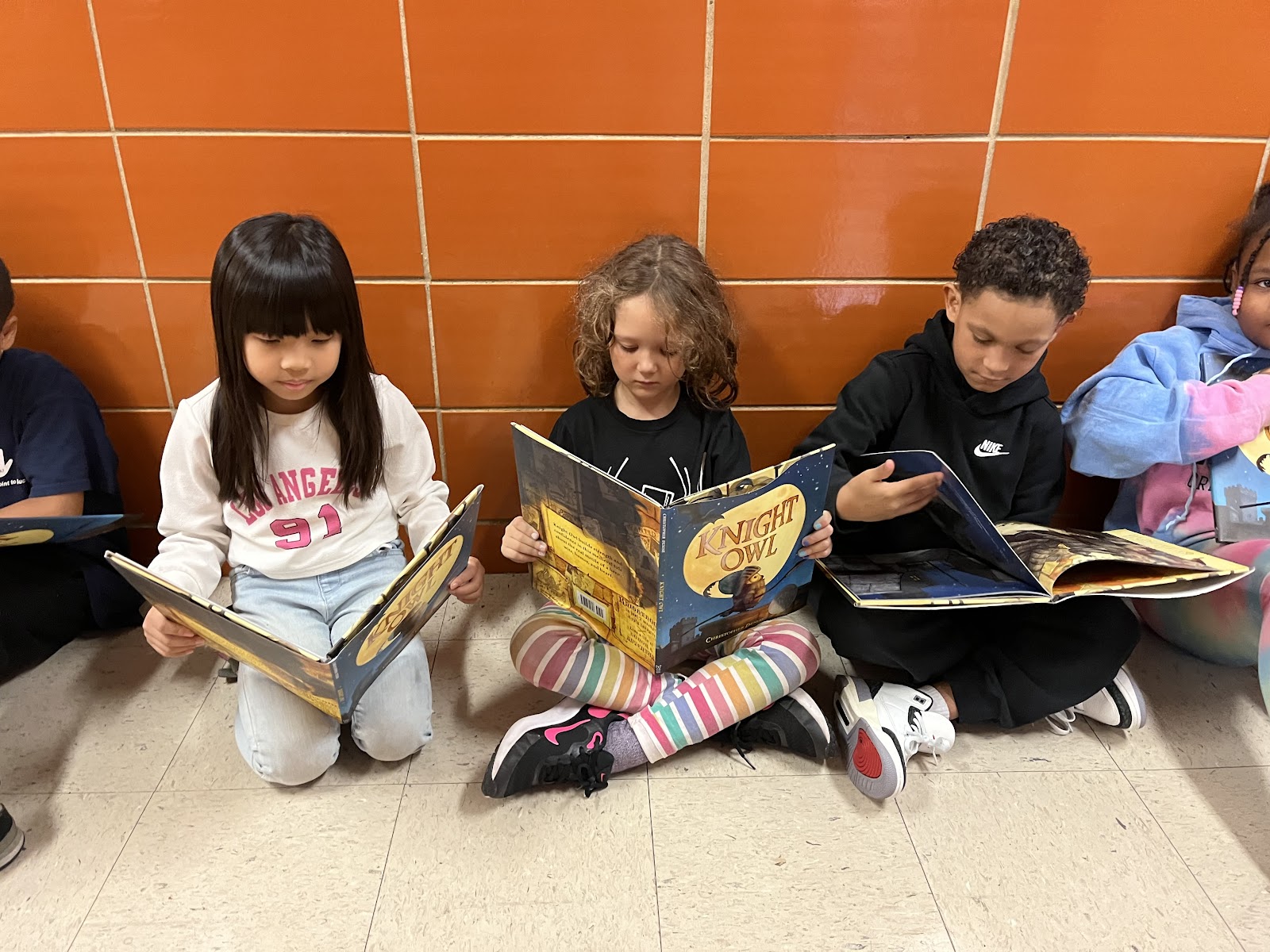 |
| Annaleigh Ashford (left) in WICKED |
"What would you do if a green person walked into the room?"
The first and second graders had an immediate reaction.
"I'd run!"
"I'd hide!"
"I'd scream!"
"I'd cry."
"Hold on" I say, "What if this person was smiling?"
That would be even worse. They've seen too many scary clown movies. This green person wouldn't stand a chance because green is different and different is scary.
"What if the green person walked in with me? What if I introduced her to you and told you her name was Elphaba? What if I was holding her hand and told you she was my friend? And what if you got the chance to know her and you realized she wasn't scary at all?"
The tension in the room started to settle and small chuckles of relief replaced it. The children started to see that maybe they could give this Elphaba a chance. With that, I began to tell them Elphaba's story as told in the Broadway musical WICKED. How she was born green and rejected by her family. How everyone she met ran away, or hid, or screamed, or cried, or wanted to hurt her. How she was just someone who was different on the outside, but had feelings like the rest of us. How a small kindness is healing and empathy is important.
I asked them again, now that they had this new information, "What would you do if Elphaba walked into the room?" Their answers reflected goodwill and compassion. Of course, this was the lesson. We should try to avoid judging someone on their outward appearance and get to know them first. If we do and it turns out we don't like them, at least we made an informed decision.
This is how I introduced the children to the work of Tony Award Winner Annaleigh Ashford for my Broadway Books First Class program. Annaleigh played Glinda in national tour of WICKED and later recreated it on Broadway. I'd found my hook! And I found a theme.
This theme of not discounting others based on appearance was also evident in Annaleigh's 2007 Broadway debut in a little show called LEGALLY BLONDE. In that show, based on the wildly popular movie starring Reese Witherspoon, a perky blonde girl obsessed with all things pink wants to become a lawyer. She is ridiculed, mocked, and dismissed because she doesn't fit the expectations ascribed to a serious law student. However, her unconventional viewpoint proves to be the very thing that wins cases.
 |
| Annaleigh Ashford (in white) as Margot in LEGALLY BLONDE |
Judgement and dismissal are painful to experience, yet they come so naturally to us. We can do better.
At around the same time Annaleigh was performing in these shows, I had a student who the doctors believed had a rare disease called Proteus Syndrome. His appearance was disfigured by benign tumors causing abnormal tissue growth of bones and skin. He resembled John Merrick "The Elephant Man" and the disease left him breathing through a tracheotomy tube. He was also a talented artist who loved to create pictures. He was a typical first grader...inside.
This small boy had to endure so much and one thing he didn't need were the stares of shocked onlookers. I'd take the class out to a show or to the museum and people would literally gasp or, even worse, scream when they saw him. This happened again and again. This was a guttural response, not premeditated or planned. Yet, the onslaught of negative reactions took its toll on him. How could it not? And how do you walk that reaction back?
I'm proud to say that in our class he became just another student. His condition became secondary to who he was. My mom always told me the most beautiful woman can become ugly or the homeliest person could become beautiful depending on their personality and how they treat others. That's what happened. We all saw this boy in a different light once we got to know him. His humor, his laugh, his determination, all took center stage.
I thought of him as we prepared for Annaleigh's visit. I wondered how I could impart this lesson of seeing beyond the surface to the person underneath. We had interesting discussions. The children changed their minds about Elphaba. They would give the green witch a chance after all. These life lessons must be revisited time and time again.
Each Broadway Books First Class guest artist visit centers on a children's book that supports a theme. We uncover themes as we study the work of each guest artist. For Annaleigh, this one theme was clear. So, I chose the Caldecott Honor Book KNIGHT OWL by Christopher Denise for her to read aloud.
 |
| Annaleigh Ashford reads KNIGHT OWL |
This children's book is about a little owl who dreams of becoming a knight! Who could ever imagine this tiny feathered creature could succeed? Whoo? Whoo? But this determined lad has his parents blessing and works had to pass knight school. In fact, his owley disposition works in his favor! He can stay up nights when the other knights fall asleep. And he bonded over shared traits with the dragon that threatened the kingdom. In the end, this little owl became an unexpected hero. See, you never know.
Before the reading, a child asked Annaleigh if she could read the book in a British accent. They knew she could do this accent because of her work in KINKY BOOTS and SWEENEY TODD. She countered with, "How about I use a British accent for the owl?" And she did. And it was brilliant. Another layer, another way to truly see someone - not for what they appear to be, but for who they truly are.
 |
| Each student took home a copy of KNIGHT OWL |




